* * * * *
Fondillón & Moscatel, Classic Wines of Alicante (Levante region)
Comunitat Valenciana
Photographing monastrell grapes in Alicante
Gerry Dawes copyright 2011 / gerrydawes@aol.com
Located between Cataluña and Andalucía along Spain’s south central coast, the vineyards of the Levante grow on land that rises from the coast to significant elevations inland. Until recently, the region’s wines had a poor reputation, except for Alicante, known for wines made from moscatel and monastrell: its moscatel romano-based sweet white wines and Fondillón, a classic, monastrell-based rancio (a purposely oxidized, slightly sweet wine), a once nearly extinct wine.
Moscatel grapes in the Alicante market.
Gerry Dawes copyright 2011 / gerrydawes@aol.com
Grape vines were introduced into Alicante by the Phoenicians, wine was made here by the Romans and the praises of Alicante wines were sung by the Moors. The Alicante DO, encompasses 37,000 acres divided into two sub-regions in Alicante province: La Marina, just inland from the area’s popular beach towns, and the Alicante subzone (northwest of the capital, Alicante), whose main growing area is the Vinalopó valley. The winters are short and the summers are long, hot, nearly rainless.
Monastrell in the Vinalopó region of Alicante
Gerry Dawes copyright 2011 / gerrydawes@aol.com
The Alicante wine type that is a revelation is the classic Fondillón, a favorite of France’s Louis XIV (the Sun King) and of Alexandre Dumas pere’s fictional Count of Monte Cristo. A wine with 500 years of written history (supposedly Fondillón was on Magellan’s ill-fated trip around the world), until recently, this semi-sweet, Monastrell-based rancio wine, which is aged for no less than eight years and often more than twenty before release, was nearly extinct except for a few wines made by small family bodegas.
Signing a Fondillón barrel at Salvador Poveda, Monóvar (Alicante)
Photo courtesy of Bodegas Salvador Poveda
The top producer of Fondillón is the centenarian bodega of Salvador Poveda in Monóvar and the star of Poveda’s stable is the Gran Reserva de Fondillón 1980, a splendid, profound, mahogany-colored jewel that tastes literally like someone mixed a great oloroso sherry with a vintage port.
Rafael Poveda in his family's Fondillón bodega in Monóvar.
Gerry Dawes copyright 2011 / gerrydawes@aol.com
Rafael Poveda told it is made: “We use only 100% Monastrell grapes from the Vinalopó valley selected in the best harvests with a very high concentration of sugar–always higher than 16̊ Baumé, often 18̊.
Monastrell, Vinalopó, Alicante
Gerry Dawes copyright 2011 / gerrydawes@aol.com
Sometimes we put the grapes out on mats in the sun for several days to increase the sugar concentration. We leave the must in contact with the skins only up until it begins to ferment, so skin contact is very short. The wine is born as soft, fruity and light-colored as a Bordeaux, but without the tannic astringency. When the fermentation is finished, we have a very aromatic wine that is slightly sweet, medium-dry. We age it in old oak barrels, usually in a sherry-like solera, but in an exceptional vintage like 1980, we will age the wine separately, without mixing it in the solera, to make an authentic vintage Fondillón.”
Felipe Gútierrez, producer of Casta Diva
Gerry Dawes copyright 2011 / gerrydawes@aol.com
Owner-winemaker, Felipe Gútierrez de la Vega makes the excellent Casta Diva Fondillón (dedicated to William Blake), which--unlike Poveda, who does short macerations--he macerates the grapes for 20-30 days and says the wine can ferment up to two months, leaving a wine with 17-18 percent natural alcohol.
Felipe Gútierrez's Bodegas Gutiérrez de la Vega produces the Casta Diva moscatels, which have also proved that Alicante can make world-class dessert wines.
Casta Diva Cosecha Miel Moscatel de Javea, Alicante
Gerry Dawes copyright 2011 / gerrydawes@aol.com
Gutiérrez, is an affable, well-read, Renaissance man who works in in a blue lab coat and plays opera (the great Valencian-born Caruso-contemporary, tenor Antonio Cortis, Montserrat Caballé and Maria Callas) as he works in his pristine winery in Parcent.
Felipe Gútierrez de la Vega, Producer of Casta Diva
Gerry Dawes copyright 2011 / gerrydawes@aol.com
Gútierrez’s Casta Diva Cosecha Miel, made from moscatel de Alejandria (also called moscatel romano) grapes grown in the coastal La Marina subzone, is a sweet, luscious dessert wine that is also a great match to such dishes star Alicante chef Quique Dacosta’s laminas de foie gras (layered foie gras with a fragrant apple compote) at the superb El Poblet in Denia.
Quique Dacosta, Restaurante Quique Dacosta, Denia (Alicante)
Gerry Dawes copyright 2011 / gerrydawes@aol.com
Gutiérrez also produces several other highly regarded wines including a dry white moscatel romano, a good bobal rosado, and several interesting reds: Imagine (dedicated to John Lennon), Viña Ulises (James Joyce and Homer), and Rojo y Negro (Nobel prize winner Camilo José Cela), a silky, exotic blend of giró (a garnacha relative), monastrell, cabernet sauvignon, tempranillo, and merlot that spends 18 months in oak, only 20% of which is new (a practice one wishes more winemakers would adopt).
Made from 100% Monastrell grapes that are allowed to hang on the vine until they become raisiny, (unlike the grapes for many other Fondillóns and sherry Pedro Ximénez grapes, which are picked and sun-dried on mats), Gútierrez’s Fondillón is a deep plummy, spicy, very rich, Port-like, but unfortified, wine that is aged for 15 years. Bodegas Bocopa’s Fondillón Alone (ah-lo-nay) is a well-made, solera-aged, red dessert wine that is another recuperation of this legendary Alicante classic that until recently was all but forgotten.
Some of these wines are reminiscent of tawny Port, others such as Bodegas Brotons Gran Fondillón Reserva 1964, Primitivo Quilés Fondillón (Hístorico) ‘El Abuelo’ Gran Reserva and Poveda Añejo Seco (made from Vidueño, an old Monastrell clone), are very much like great palo cortado sherries.
Casa Elias, Xinorlet (Alicante) - Great Regional Cusine
At Casa Elias, we lunched on some wonderful country food, including an excellent plate of assorted cured sausages,
Gerry Dawes copyright 2011 / gerrydawes@aol.com
snails with rosemary,
Gerry Dawes copyright 2011 / gerrydawes@aol.com
wonderful grilled wild níscalos (rovellones in Catalan; mushrooms),
Gerry Dawes copyright 2011 / gerrydawes@aol.com
gachamigas (a kind of pancake made with flour, water, olive oil and garlic),
Gazpacho Manchego (has nothing to do with gazpacho Sevillano, also made with rabbit & snails (dumplings, nutmeg, cloves), a great, hearty campesino dish,
Gerry Dawes copyright 2011 / gerrydawes@aol.com
and arroz con caracoles y conejo, a superb rabbit-and-snail thin-layered arroz (rice) cooked over grape vine cuttings and served with authentic all-i-oli.
Gerry Dawes copyright 2011 / gerrydawes@aol.com
I tasted a lineup of wines with Rafael Poveda at the family bodega that produces Alicante’s most renowned Fondillón. Poveda’s intense red table wines included a good Poveda Tempranillo; a big, complex, cherry-and carob flavored Borrasca Classic Tinto 2000 from their Finca El Pou estate’s 50-year old Monastrell vines; and the massive, oak-dominated, 100% Monastrell, Borrasco Tinto Selección de Barrica (600 bottles made).
Tasting Wine at Salvador Poveda in Monóvar (Alicante).
Rafael Poveda copyright 2011 / gerrydawes@aol.com
Poveda’s intense red table wines included a good Poveda Tempranillo; a big, complex, cherry-and carob flavored Borrasca Classic Tinto 2000 from their Finca El Pou estate’s 50-year old Monastrell vines; and the massive, oak-dominated, 100% Monastrell, Borrasco Tinto Selección de Barrica (600 bottles made).
The End: Fondillón & Moscatel, Classic Wines of Alicante (Levante region)


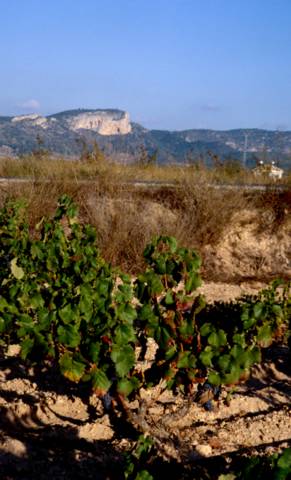
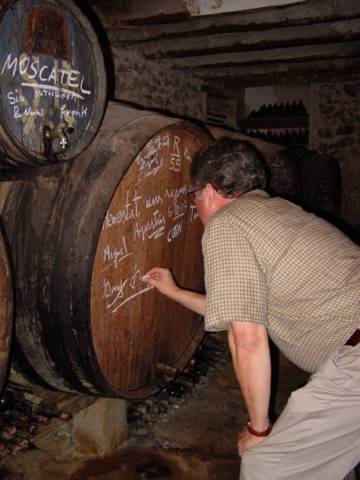





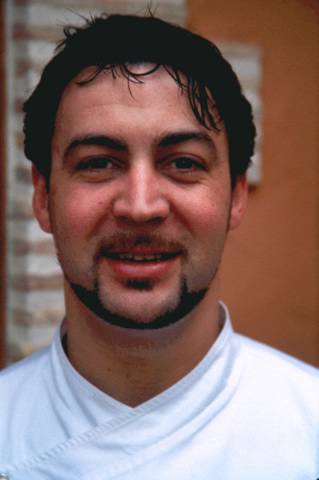


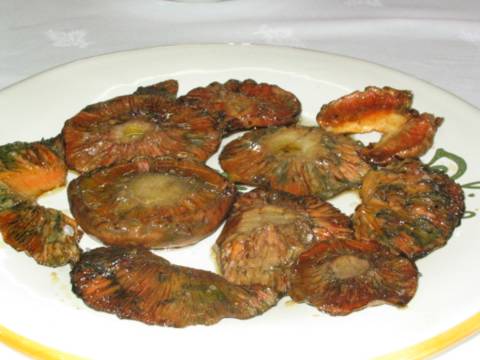



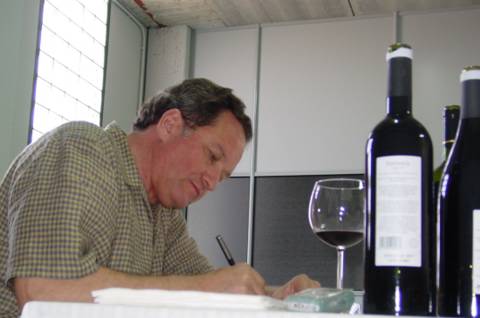
Estimado Gerry:
ReplyDeleteEl blog me ha parecido extraordinariamente bueno!!! Una maravilla. Estamos muy contentos. Tambien Elias está muy agradecido.
Un abrazo,
Rafael Poveda
=======================
Salvador Poveda S.A.
Benjamin Palencia 19
03640 Monovar - Spain
Ph 34966960180
Fx 34965473389
salvadorpoveda@salvadorpoveda.com
www.salvadorpoveda.com
Nice page. Only a few precissions:where you say "Gachas-migas" you may say "Gachamiga", and also when you say "Gachas" you must say "Gazpacho" or "Gazpachos", exactly "Gazpacho Manchego" in oposition to the famous "Gazpacho Andaluz" of South Spain.
ReplyDeleteThanks.
Abraham, Monòver.